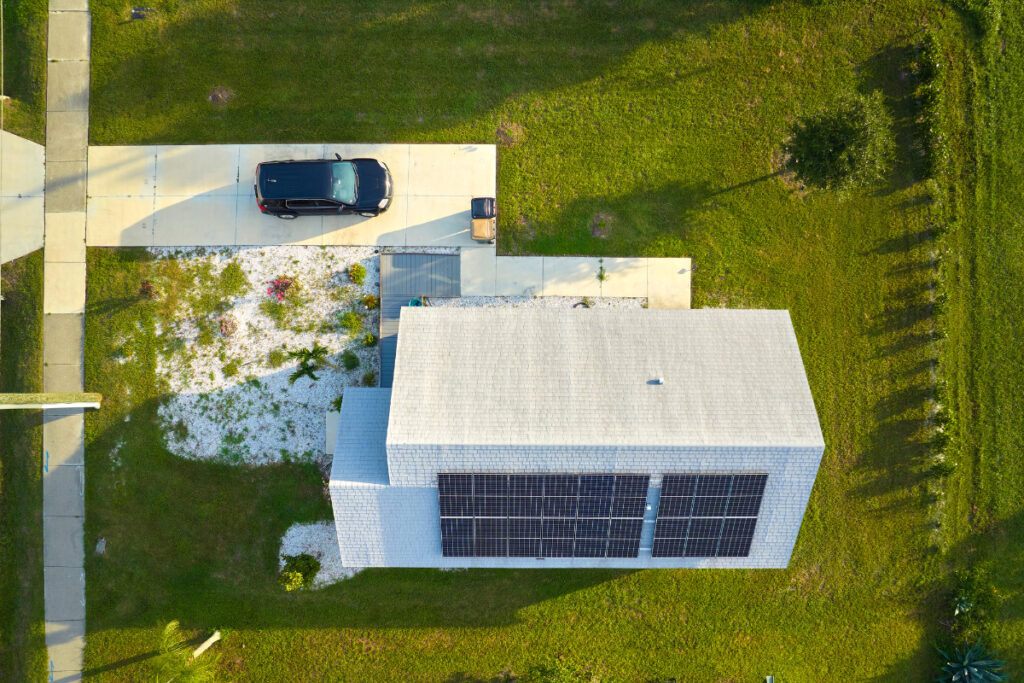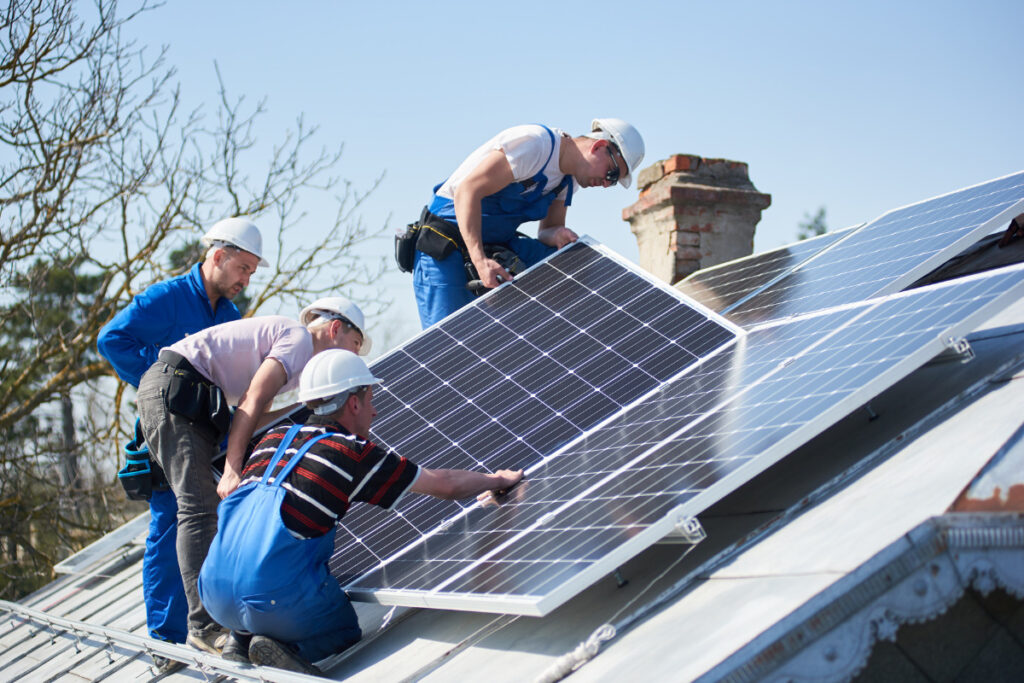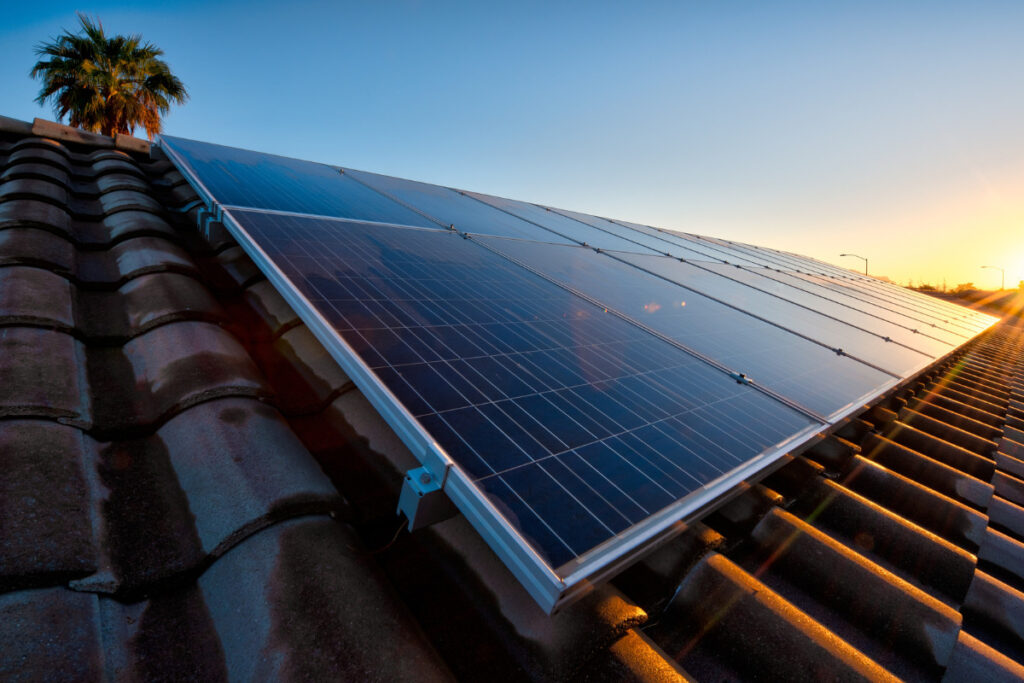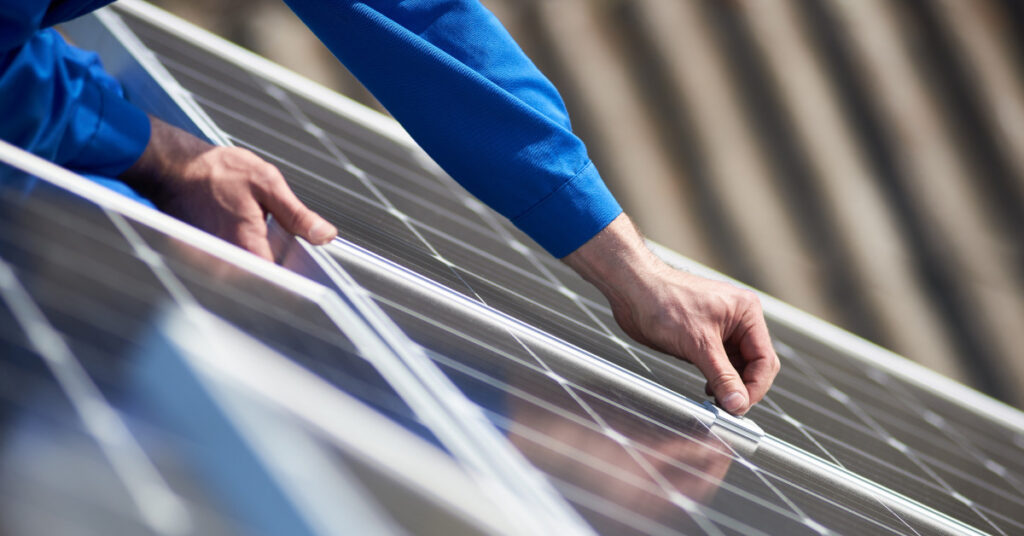Introduction
As the world increasingly embraces renewable energy, homeowners are faced with choosing between solar panels and solar roofs. Both options offer unique benefits in generating clean, sustainable power for your home.
This blog post will explore the differences between these two innovative technologies. Look into their efficiency, cost factors, installation processes, and advantages. By understanding each option’s distinct features and considering your needs and preferences, you can make an informed choice to optimize energy savings while enhancing your home’s eco-friendly appeal. Join us as we navigate the Solar Panels Vs. Solar Roofs debate so that you can invest wisely in your journey towards green living!
Understanding Solar Panels And Solar Roofs
Solar panels and solar roofs both harness the power of the sun to generate electricity, but there are significant differences in their efficiency, cost, installation requirements, and maintenance considerations.
Efficiency And Cost Differences
Efficiency and cost differences between solar panels and solar roofs are crucial factors to consider when choosing the best solar energy solution for your home. To better understand these differences, let’s take a look at the following table:
| Solar Panels | Solar Roof | |
|---|---|---|
| Efficiency | Higher efficiency than solar shingles | Lower efficiency than solar panels, but Tesla's solar roof is more effective in generating solar power |
| Cost | Installed on top of the construction cost, more expensive than solar shingles Traditional solar panels are cheaper than Tesla solar roofs. | Integrated into the construction cost, making them a more cost-effective option than solar panels. Tesla solar roofs are more expensive than traditional solar panels but offer longer lifespan and more efficient energy production. |
| Warranty | Longer warranty | Tesla solar roofs come with a longer lifespan |
When comparing efficiency and cost differences, you must consider your specific needs, preferences, and budget to determine if solar panels or solar roofs are the right choices for your home.
Installation And Maintenance Considerations
When deciding between solar panels and solar roofs, it’s essential to consider the installation and maintenance factors involved. Here’s a comparison of these aspects:
- Installation Process:
| Solar Panels | Solar Roofs |
|---|---|
| Typically quicker and easier to install on existing roofs, with less disruption to your home. | Require complete removal of your existing roof, resulting in a more extensive process that takes longer and may be more disruptive. |
- Roof Compatibility:
| Solar Panels | Solar Roofs |
|---|---|
| Can be installed on various types of roofing materials, including asphalt shingles, metal, tile, and flat roofs. | May only be compatible with specific roofing materials or designs. |
- Weight Considerations:
| Solar Panels | Solar Roof |
|---|---|
| Heavier than solar shingles; may require additional structural support if the roof is not already strong enough to accommodate their weight. | Lighter than traditional solar panel systems; generally do not require additional structural support. |
- Maintenance Needs:
| Solar Panels | Solar Roofs |
|---|---|
| Both systems require periodic cleaning to remove dirt and debris for optimal performance. | |
| Easier to access for maintenance since they are mounted on top of the roof | Integrated into its structure |
- Repair Requirements:
| Solar Panels | Solar Roofs |
|---|---|
| Individual panels can often be replaced without affecting the entire system if damaged or malfunctioning. | Repairs may involve replacing entire sections of the solar roof tiles, potentially involving more labor and expense. |
- Roof Warranty & Insurance Considerations:
| Solar Panels | Solar Roof |
|---|---|
| Many homeowners' insurance policies will cover both solar panels and solar roofs upon proper disclosure. | |
| Some roofing warranties may become void when adding traditional solar panel installations. | |
- Professional Expertise Required:
| Solar Panels | Solar Roofs |
|---|---|
| Both solar panels and solar roofs should be installed by qualified professionals, but installing a full solar roof typically demands a higher level of expertise due to its complexity. | |
Homeowners can decide based on their specific needs, preferences, and budgets by understanding these installation and maintenance considerations between solar panels and solar roofs.
Advantages Of Solar Panels
One advantage of solar panels is their cost-effectiveness, as they are generally less expensive than solar roofs and can be a practical option for homes on a budget. Keep reading to learn more about the benefits of choosing solar panels over solar roofs!
Cost-effectiveness
One of the primary advantages of solar panels over solar roofs is their cost-effectiveness. Solar panels have been on the market for longer, allowing manufacturers to refine the production process and drive down costs. As a result, solar panels typically offer a better return on investment (ROI) when compared to solar roof installations. For example, traditional photovoltaic solar panels can be purchased at an average price between $3 and $5 per watt, whereas Tesla’s Solar Roofs are currently priced around $7 to $8 per watt.
The cost savings extend beyond initial expenses and impact energy bills once your system is operational. Since solar panels generally boast higher efficiency rates than solar shingles. Upwards of 20% for top-tier products. They capture more sunlight and convert it into electricity for your home or business. This means you’ll generate more clean energy in less time with traditional panels compared to integrated roofing systems.
Additionally, many governments offer financial incentives. Like tax credits and rebates that significantly reduce upfront installation costs for those who invest in renewable energy sources. However, such programs are often available on a first-come-first-serve basis or limited by annual funding caps. So households need to act fast if they desire access to these subsidies that make both options even more budget-friendly choices.
In conclusion: while aesthetics play an important role in choosing between classic rooftop-mounted setups versus innovative technologies like all-in-one panel-plus-shingle products from Tesla Inc., assessing potential ROI & long-term benefits should remain chief considerations during decision-making processes because going green shouldn’t force homeowners into tight financial spots either way!
More Flexibility In Installation
Solar panels offer more flexibility in installation as compared to solar roofs. With traditional solar panels, homeowners can choose where they want the panels installed on their property, making it easier to find the optimal location for maximum sunlight exposure. Solar panels are also modular and can be added or removed as needed, providing greater flexibility in customizing a solar system’s size and capacity.
On the other hand, solar roofs require a complete roof replacement, which limits placement options and may only be suitable for some types of roofing materials. Additionally, since solar shingles are built into the roof, changing or adding to an existing system may be challenging if energy needs increase over time. Ultimately, this makes solar panels a more versatile option for installation and customization.
In conclusion, while both solar roofs and solar panel systems have their advantages and disadvantages regarding installation considerations – including appearance – it is important to evaluate your individual needs before deciding which one will best serve you in terms of efficiency, cost-effectiveness, and sustainability.
Proven Technology
Solar panels have been on the market for several decades and have proven reliable and effective renewable energy sources. They are widely used in homes, commercial buildings, and even utility-scale solar farms worldwide. With technological advancements, solar panel efficiency has improved significantly, making them more cost-effective.
Solar panels use semiconductors such as silicon to leverage photovoltaic cells that convert sunlight into electricity. The technology behind this process is well-established and has undergone thorough testing through numerous installations worldwide. Additionally, most solar panels come with warranties of up to 25 years or more. This assures homeowners their investment is protected.
Solar roofs offer an aesthetically pleasing way to produce clean energy. But they’re a new concept with cost and structural considerations. Choose wisely based on your budget and sustainability goals.

Advantages Of Solar Roofs
Solar roofs offer higher efficiency than traditional solar panels, as they provide a direct source of electricity while also acting as a protective roofing system for your home. Want to learn more about the benefits of solar roofs? Keep reading!
Aesthetically Pleasing
Solar roofs are gaining popularity due to their sleek design and aesthetic appeal. Unlike traditional solar panels, solar roof tiles blend seamlessly with the rest of the roofing materials, offering a more uniform look for homes. This makes them an excellent option for homeowners who want to embrace sustainable technology without compromising their home’s curb appeal.
Tesla’s solar roofs are particularly noteworthy as they come in different styles that mimic roofing designs such as slate or Spanish tiles. This means that homeowners can opt for a customized look that fits their preferences while enjoying clean energy from the sun. Additionally, solar roofs add value to your home and help reduce your environmental impact, making them a worthwhile investment.
In contrast, some homeowners may see traditional solar panels as unsightly since they’re installed on top of finished roofs and protrude above the roofline. However, if cost-effectiveness is your priority over aesthetics, conventional panels will be a better fit since they’re typically cheaper than solar shingles despite having similar efficiency ratings.
Higher Efficiency
One major advantage of solar roofs is their higher efficiency in generating electricity. Solar roof tiles are designed to replace traditional roofing materials directly, incorporating photovoltaic cells into the structure. As a result, they can generate more power per unit area compared to regular solar panels. For instance, Tesla’s solar roof tiles can produce up to 20% more energy than traditional solar panels due to their unique design and advanced technology.
Another factor contributing to the higher efficiency of solar roofs is that they can better capture sunlight at different angles throughout the day. Regular solar panels need direct sunlight and optimal orientation for maximum output. Still, with a sloped roof system like Tesla’s, which include microinverters built under each tile, it increases energy production while also providing insulation benefits for homes all year round without any extra costs on additional roofing materials.
Overall, investing in a solar roof may be more expensive upfront than installing traditional rooftop solar panels. Still, over time it pays off as you’ll save money on your energy bills – this is especially true for homeowners who have high electricity usage throughout the year or live in areas with ample sunshine where they can fully utilize their PV systems’ capabilities!
Integration With Your Home’s Roofing System
Solar roof tiles are designed to replace traditional roofing materials directly, creating an aesthetically pleasing finish that complements your home’s overall look. One of the significant advantages of solar roofs is their seamless integration into your existing roofing system. Besides enhancing curb appeal, solar roofs save you money by negating the need and cost of installing or maintaining two separate systems, i.e., your roofing and solar panels. Additionally, unlike solar panel installations that require mounting brackets on top of your finished roof’s surface, solar roofs lay directly onto the deck with no visible penetrating features.
Furthermore, integrating solar power during construction means better structural integrity and more efficient energy production since less heat escapes through gaps between panels and rooftops. Aesthetics aside, investing in thin-film technology used to make sunroof shingles also guarantees durability beyond traditional asphalt shingles since they can withstand extreme weather conditions such as hailstorms and windblown debris without breaking or cracking easily. Tesla’s line of integrated products offers a one-stop-shop solution for both durable roofing options and high-efficiency photovoltaic cell technology in one package.
Overall, once installed correctly within a given region’s weather patterns – including sunlight availability -homeowners generally have little worry about long-term maintenance costs when choosing solar roofs over traditional setups—not only are they reliable renewable resources, but they also add value to homes while reducing energy bills annually based upon local utility rates.

Factors To Consider When Choosing Between Solar Panels And Solar Roofs
When deciding between solar panels and solar roofs, it’s important to consider factors such as budget, roof condition, energy needs, and future plans – keep reading to learn more about each consideration.
Budget
Budget is one of the most significant factors to consider when choosing between solar panels and solar roofs. The installation cost for both systems can vary depending on several factors, including the size of your home, energy needs, location, and available incentives. Solar panels are generally less expensive upfront than solar roofs because they require less specialized equipment and labor. However, a well-designed solar roof with high-efficiency tiles can pay off energy savings and reduce maintenance costs over time.
For example, traditional rooftop solar panels may be the better option if you have a limited budget but still want to invest in renewable energy technology. You can start small by installing enough panels to meet your basic energy needs and add more over time as your budget allows. However, if cost is not an issue and you want to maximize efficiency while maintaining an aesthetically pleasing appearance for your home’s exterior, then a sleek Tesla Solar Roof might be the perfect fit.
Ultimately, determining whether to install solar panels or a solar roof will depend on many personal considerations beyond budget alone. It’s wise to consult with experienced professionals who thoroughly understand both systems’ pros and cons so you can make an informed decision that meets all your long-term goals without compromising on any other important factor, such as design aesthetics or environmental impact.
Roof Condition
The roof’s condition is essential when choosing between solar panels and solar roofs. Solar roofs require a structurally sound and robust roofing system to support the weight of the tiles. If your roof is old or in poor condition, it may not be strong enough to withstand the additional weight of installing a solar roof. Traditional solar panels may be a better option in such cases as they do not add significant weight to your existing roof.
Traditional solar panels are more flexible and adapt easily to different roofing systems. Moreover, if your house has multiple levels or angles on its roofline, it can pose challenges for installing solar shingles due to their rigid shape. Additionally, if you plan on replacing your current roof soon, opting for regular rooftop-mounted solar panels makes more sense than investing in a long-lasting but costly Tesla SolarRoof installation.
Overall, before deciding which approach best fits your needs based solely on aesthetics or efficiency goals, ensure that you evaluate whether adding new tile technology is safe from an engineering standpoint by consulting with experts like certified installers and engineers that specialize in this type of work to make sure everything goes smoothly!
Energy Needs
Your energy needs are crucial in deciding whether to use solar panels or roofs. If you have high energy consumption, larger roof space, and budget constraints, installing solar panels might be the best option. On the other hand, solar roofs could be a better fit if you live in a smaller house with fewer energy requirements and want an aesthetically pleasing option that integrates seamlessly into your home’s roofing system.
Another factor to consider when assessing your energy needs is your future plans. Plan on expanding your household or increasing your energy consumption over time. Opting for traditional photovoltaic cells might make more sense as you can easily add more panels in parallel while minimizing additional wiring costs. Solar roofs are generally designed specifically for each home’s unique requirements and may not be able to accommodate these changes without considerable expense. Ultimately, when choosing between the solar panel and roof options, understanding how much power you need now and what power demands will look like down the road is essential.
Future Plans
The future of solar technology looks promising, with continued advancements in solar panels and solar roofs. One area of focus in the industry is integrating battery storage with solar systems, allowing homeowners to store excess energy generated during peak sunlight hours for use later on. This can provide greater energy independence and cost savings over time.
Additionally, increased affordability is expected as more companies enter the market and competition drives down prices. Innovations in materials will enhance solar efficiency and durability, making it more available to homeowners. By 2025, around 50% of new rooftop installations is estimated to feature solar panels or roofs, supporting global renewable energy goals.
The Future Of Solar Technology
The future of solar technology is promising, with advancements in both solar panel and solar roof technology, integration with battery storage, and increased affordability.
Advancements In Solar Panel And Solar Roof Technology
Advancements in solar panels and solar roof technology have significantly changed how we harness solar energy. Photovoltaic cells with higher efficiency generate more electricity from smaller systems. Integrated inverters efficiently convert solar panel DC power to home-use AC power.
Another key development is the integration of battery storage with solar systems. Homeowners store excess energy for later use with battery storage, especially during low sunlight or high electricity costs.
Technology advances and investments from private and government sectors promise even greater improvements in solar technology. As it becomes more affordable and accessible, solar will aid environmental challenges and save consumers money on utility bills.
Integration With Battery Storage
Pairing solar panels or roofs with battery storage maximizes solar energy savings. It stores excess energy for night use and reducing reliance on grid electricity.
For example, Tesla’s Powerwall battery stores excess energy from its solar roof tiles or panels, allowing homeowners to use renewable energy even when the sun is not shining. By integrating these two technologies, households can achieve greater energy independence and reduce their carbon footprint.
Furthermore, advancements in battery technology have made them more efficient and affordable than ever. While adding cost, battery storage in a solar setup cuts expenses by reducing grid reliance and avoiding peak pricing.
Increased Affordability
As solar technology advances, the cost of solar panels and solar roofs is becoming more affordable. In recent years, the prices of both technologies have significantly decreased due to increased competition and government incentives. One example is the Solar Investment Tax Credit (ITC), which allows homeowners to deduct 30% of the installation cost from their federal taxes.
Additionally, many solar panel manufacturers now offer leasing options that allow homeowners to install solar panels with little or no upfront costs. This option has enabled homeowners on a tight budget to go solar without breaking the bank.
With advancements in battery storage technology, sustainable living can be even more attainable and affordable than before. Battery storage systems store excess solar energy from peak sun hours for later use during high energy demand. This means less reliance on traditional grid systems and lower electricity bills over time. As renewable energy becomes more affordable, it’s easier to make eco-friendly choices for our homes’ power sources.
Conclusion
There are many factors to consider when choosing between solar panels and solar roofs. While solar panels offer more flexibility and cost-effectiveness, solar roofs provide higher efficiency and better aesthetics. The decision ultimately depends on your individual needs, preferences, and budget.
As technology advances and renewable energy demand grows, both options will become more efficient and affordable. Sustainable energy investment, through solar panels or a Tesla solar roof, benefits the environment and your wallet long-term.
So let’s step towards a greener future with clean energy solutions like photovoltaic cells that harness the sun’s power. Make an informed decision when selecting these two green options & reap significant benefits from it!
FAQs:
- What is the difference between solar panels and a solar roof?
Solar panels go on top of the roof, but a solar roof integrates photovoltaic cells into the roofing material.
- Which option is more cost-effective: solar panels or a solar roof?
While costs depend on factors like climate and sunlight, traditional panels are usually cheaper than a new rooftop system.
- Are there any maintenance requirements for either option?
Both traditional panels and integrated roofing materials require periodic cleaning to ensure optimal energy production. Still, most homeowners find that these duties can easily be incorporated into regular household upkeep routines.
- Which option offers better aesthetics?




[…] you considering upgrading your home with solar roofing? Want to know what factors are given importance when looking for solar roofing? If you already have […]